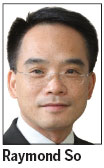Old-school public consultation inadequate for current times
Updated: 2013-08-08 07:20
By Raymond So(HK Edition)
|
|||||||||

Consultation has been an established practice in pursuing public policy in Hong Kong since British rule, which takes various forms including informal gatherings such as luncheons or dinners and formal consultations such as public forums or written consultations. However, despite this well-established system, there are growing outcries of there being insufficient consultation. Very often when a public policy is to be launched, some interested groups will emerge and claim they have not been consulted. They will request that the public policy should be halted because of insufficient consultation, no matter how much consultation has already been done. This clearly shows that the existing consultation process can no longer meet the current situation.
The consultation process worked well under British rule, not because the British administration cared more about public opinion and the consultation process operated better then. Rather, the same consultation process has become insufficient under the current situation, calling for changes in the consultation strategy.
Under the British rule, the opposition barely had a voice in the Legislative Council (LegCo) as its members were not directly elected, while the district councils focused more on neighborhood issues, and the media was friendlier to the government. Hence, the government faced much less political pressure and resistance in pushing through a policy as long as it involved no changes to the political system. The consultation process at that time was relatively simple, and even considered merely a step to fulfill the procedural justice, because there were not many objections.
Technology was also a major element in making consultation under British rule simple. More importantly, the power of the Internet was not as strong in the mid 1990s as now. People would not be motivated to collectively oppose a particular policy.
To the government, the well-established consultation process lay down the foundations of what good consultation is. However, the current situation demonstrates that the established steps in public consultation are no longer good for the more complicated environment. Take the Tung Chung development plan as an example. The government had organized the first consultation process, and heard not much opposing opinion. It then revised the development plan to accommodate the opposing views collected during the first round of consultation and launched a second-round consultation. However, the second-round consultation received a lot of opposition, with some even calling for abolishing the plan and restarting the consultation all over again, claiming the stakeholders were not informed of the first-round consultation. And they asked for participation so as to change the development plan.
If we look at the issue from a traditional consultation process perspective, the first-round consultation has summarized all the views and this process is over. The request to redo the stage-one consultation is not sensible because there will always be new ideas flowing in the consultation process. If everything needs to go back to step one whenever there is any opposition, then we are not going to accomplish anything. However, the cruel truth is that there are always new views in launching new public policies. When these views are not fully addressed or these demands are not fulfilled, the administration will be accused of "insufficient consultation". This is particularly interesting, because nowadays many concerned groups suddenly emerge during the very late stage of the consultation process. Worse still, these later views always cause a lot of debates over the public policies. The government has suffered a lot in the consultation process these days.
The problem lies in the multidimensional nature of modern public consultation. The definition of stakeholder is now very blurred. Virtually every single person can be considered a stakeholder. This makes the consultation process particularly challenging because there will always the case of missing one single opinion, hence the accusation of insufficient consultation.
This shows that the traditional way of consultation is not working well now. We need to re-engineer the whole consultation process. More importantly, we need to engage young people in more creative ways as they normally do not submit formal consultation via traditional channels. If their views are not taken into consideration, the public policy is unlikely to be carried out smoothly because of the "insufficient consultation".
The author is dean of the School of Business at Hang Seng Management College.
(HK Edition 08/08/2013 page1)